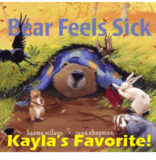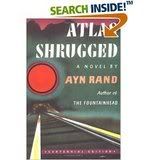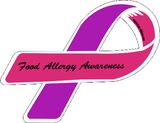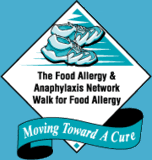Thursday, May 15, 2008
Food Allergies in Schools
Even though Kayla will not be entering the public school system for another two years (she’ll stay where she is through kindergarten), I have it on my list to contact the school to start inquiring about their policies for food allergy management. The thought of leaving her in the care of the public school system leaves me feeling downright terrified. One of the reasons why is highlighted in my rant from Tuesday.
With new New Jersey state guidelines due out soon and some federal guidelines on the horizon, I hope that I will have it easier than some of the Moms with kids in school today.
I was recently directed to an article, Addressing Food Allergies, which was published in a school district magazine. The article has some information on upcoming policies and guidelines and gives some examples of what some schools, ahead of the curve, are doing to manage food allergies.
I was happy to see them give examples of allergies other than peanuts. With fewer kids outgrowing milk and egg allergies, schools will be seeing more of these allergies in the coming years.
This article also highlights what is wrong with the policies today.
I for one want Kayla’s picture and allergy and emergency action plan plastered on every wall of the school.
With food allergies there is no way to manage them that will make everyone happy. Yes, the school has to manage the needs of food allergic children with the desires of the non-food allergic children. Like with any restrictions, you will always have some parents of the non-food allergic kids upset. But there are ways to successfully manage things without all out bans and without putting the allergic kids at unnecessary risk.
Education is the key to increasing awareness and cooperation both in schools and other areas of our children’s lives. There are a lot of great people and organizations out there working for that cause. Many of us are just Moms who will fight to keep our kids safe.
I have some good people in my life that will help me with the schools. I am hoping that our luck with Kayla’s preschool will continue through public school.
With new New Jersey state guidelines due out soon and some federal guidelines on the horizon, I hope that I will have it easier than some of the Moms with kids in school today.
I was recently directed to an article, Addressing Food Allergies, which was published in a school district magazine. The article has some information on upcoming policies and guidelines and gives some examples of what some schools, ahead of the curve, are doing to manage food allergies.
David, not his real name, of Princeton, N.J., is allergic to milk products and is severely allergic to peanuts and tree nuts. The 7-year-old sits at a special table in the cafeteria. But when his elementary school science class was using milk in a lab experiment recently, David didn't think it would hurt to peer through a microscope. Yet his eye started itching, and he was sent to the nurse.
I was happy to see them give examples of allergies other than peanuts. With fewer kids outgrowing milk and egg allergies, schools will be seeing more of these allergies in the coming years.
This article also highlights what is wrong with the policies today.
But a stumbling block for Wilmette and most school districts is privacy, which prevents schools from divulging student health information. David's science teacher, for example, was doing an experiment with milk because he had never been informed of David's allergy.
I for one want Kayla’s picture and allergy and emergency action plan plastered on every wall of the school.
With food allergies there is no way to manage them that will make everyone happy. Yes, the school has to manage the needs of food allergic children with the desires of the non-food allergic children. Like with any restrictions, you will always have some parents of the non-food allergic kids upset. But there are ways to successfully manage things without all out bans and without putting the allergic kids at unnecessary risk.
In the Appoquinimink (Del.) School District, a pre-K12 district with over 8,000 students, birthdays in the five elementary schools are celebrated once a month in the cafeteria. Teachers use pencils and stickers as special prizes in the classrooms instead of candy and food as they did years ago, explains Loretta Newsom, a school nurse at Cedar Lane Elementary School.
In the Penn-Trafford (Pa.) School District, children in the five elementary schools are not allowed to bring cupcakes or home-baked cookies for birthday parties and other celebrations. Instead, they must order snacks from the school's cafeteria service from a preapproved list of snacks that do not contain peanuts or tree nuts. Parents of children with serious egg or milk allergies, for example, would receive a list of snacks that do not contain those allergens, explains Peggy DeNinno, assistant to the superintendent. Parents bring orders to the nurse, who double-checks that the snack includes only safe ingredients for the particular class. One student, for example, has a serious allergy to cinnamon, so the snack list for that class has foods that do not contain that spice.
Education is the key to increasing awareness and cooperation both in schools and other areas of our children’s lives. There are a lot of great people and organizations out there working for that cause. Many of us are just Moms who will fight to keep our kids safe.
I have some good people in my life that will help me with the schools. I am hoping that our luck with Kayla’s preschool will continue through public school.


 Name:
Name:





















1 Comments:
I wish more schools (like ours) would take these steps. Not only for allergic children, but for the health of all children in general. We worry about obesity in our children, then we have weekly school parties with candy and cupcakes and ice cream! I just don't think it's necessary.
Thanks for letting me rant. :)
Post a Comment
<< Home